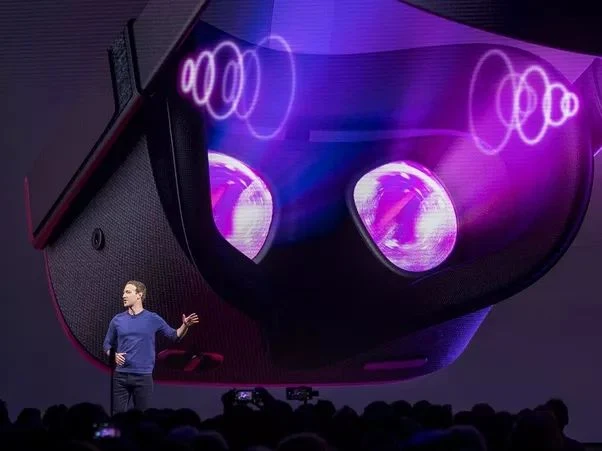Which Technology Company Do You Most Admire?
1. Facebook/Oculus Virtual Reality
Facebook's $2 billion acquisition of Oculus
even before it went public should show its potential. Unfortunately for Oculus,
it was a difficult journey, as John Carmack, a respected game developer, filed
a lawsuit for his contribution and left his game company to join Oculus.
The parent company of the game company claims that his donation was made when he
was a former employer-employee. In addition, best buy's plan to sell headphones
failed, and there were problems with the early delivery of headphones. Best Buy
was also determined to lock in the game behind the exclusive deal.
Related Topics:
2. Google
Starting with virtual reality, Google
launched a $15 cardboard headset called Google Cardboard. The board is specially
designed to use virtual reality applications on Android smartphones.
Since
then, it has launched a more robust headset called Google daydream view, which
is conceptually similar to Google Cardboard and costs $79. You still put the
phone in the headset, it can be your monitor. The headphones are mainly a pair
of lenses that divide the screen into two images.
3. Microsoft Holographic Lens
Microsoft's virtual reality headset is still
under development but has expanded to include hybrid reality (or augmented
reality), where virtual images are superimposed on real-world objects.
While
Holo Lens is still under development, Microsoft is showing more and more
practical applications for games and headsets, such as architectural
engineering and CAD design.
4. Magic Leap
Magic leap is a very mysterious start-up company
that has raised more than $1.5 billion, so it has a lot to do. When projecting
the digital light field in the user's eyes, the virtual retina display
installed on its head superposes the computer-generated three-dimensional
images on real-world objects.
This allows 3D objects to be placed in the
user's view of the real world instead of a 100% virtual view like other
headphones. As of June 2017, the company has not yet delivered goods.
5. HTC Vive
Vive, which currently costs $799, is a complex system of headphones, two handheld devices, and sensors that you can put
around your room, so it can track your movements.
HTC teamed up with valve to
develop the room-scale game, so you don't just sit on the couch and play, you
stand up and walk around. The box has 16 different components, which makes the
setup a little intimidating.
6. Samsung gear Virtual Reality
Samsung's Gear VR, which uses oculus as a
consumer device, costs $199 and is only available for the latest generation of
Samsung phones. In fact, when you slide a Samsung phone into the handset
holder, it acts like a computer device.
The headset is designed for consumers,
and so far the only app on it is a game from a third-tier developer.
7. WorldViz
Worldviz is a virtual reality company
dedicated to providing 3D interactive immersive visualization and simulation
solutions for universities, government agencies, and private enterprises.
Its software allows customers to build 3D models for product visualization,
security training, and architecture visualization. The company claims that
customers save 90% of the cost of making real physical models by making
large-scale virtual screens for building designs.
8. Apple
People are saying that if a company can really
put virtual reality in the ideal position, then it can only be a great apple.
When Facebook acquired Oculus in 2014, people were talking about Apple's missed
opportunity. Apple's name in the list of major virtual reality companies may be a bit fictional.
9. Unity Technology
Unity Technologies is a San Francisco-based
company founded in 2004. It is a leading developer of 3D game
technology. It provides an ultimate development platform for the development of
virtual reality games. Unity Technologies are the developer of Unity, which is
considered to be one of the most popular game engines so far.
According to
Gartner, the global video game market will reach US $128 billion by 2017. More
than 31% of the 1000 best mobile games use the unit. More than 600 million
gamers around the world are playing games developed in a unified way. It has
more than 4 million registered users.
Veer VR, the leading 360 / VR video-sharing
platform
In addition to large virtual reality
companies, there are many start-ups in the industry. Veer VR is a leading 360
/ VR video-sharing platform. Founded in 2016, veer has become an industry
leader by developing a cross-platform accessible virtual reality streaming
application, serving millions of users from more than 150 countries.
At present,
veer has been launched in Apple App Store, Google Play, oculus rift, and other
platforms; on November 14, with the launch of Vive focus, HTC also announced a
series of top applications and platforms will take the lead in releasing its
products, among which veer is honored to be one of the options.
Recently, veer
has also updated the new application veer editor for mobile upload of 360
photos, which enables users to upload panoramic photos on their mobile.!
Do you like virtual reality videos and
immerse yourself in the virtual reality world? View veer virtual reality, and
pay attention to and ask me any 360 or / virtual reality-related issues at any
time!
*** Please Share These Resources with Colleagues, Friends, and Family ***











